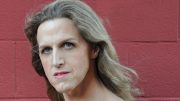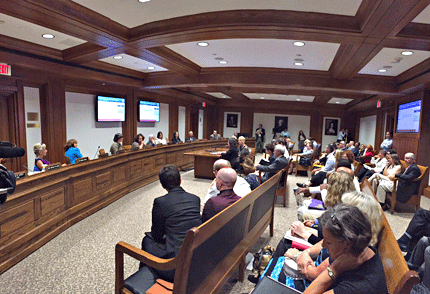
American band “Fun” members, Andrew Dost, Nate Ruess (lead singer), and Jack Antonoff.
Photo: Fueled by Ramen
By: Chris Azzopardi*/Special for TRT–
If Nate Ruess, Jack Antonoff and Andrew Dost have taught us anything, it’s this: You can be fun. and still stand up for something serious.
The breakout single that sent the New York-based band’s sophomore album, Some Nights, soaring, “We Are Young” entered the pop-culture zeitgeist almost overnight with commercial spots and a Glee rendition. Their ubiquitous earworms gave them a platform, and they stood on it and told the world – time and time again, during sold-out shows and in online essays – how they support equal rights.
In this interview with Jack Antonoff, the 28-year-old guitarist talks about being drawn to the gay community’s “inspiring” ways of uniting in the face of oppression, the stigma of being a straight man who doesn’t care about the fight and how he loves Lena Dunham like a lesbian.
Chris Azzopardi: You’re one of the gay community’s biggest supporters, and you’ve been very outspoken about it. When and why did gay issues become so important to you?
A: I wish there was a great story or a poetic answer, but I just don’t know how anyone could not be outspoken and enraged with any violation of human rights. If the government decided tomorrow to strip Jews or African Americans of certain rights, no one would say, “How did you get involved with Jews’ human rights, blah blah blah?” It would just be this universal violation that we would all be up in arms about. But the issue of gay, bisexual and trans rights, the discrimination is so ingrained in us that it’s this slow-moving process of people realizing how shameful it is, the way we treat our citizens. Anyone who is even remotely cognizant is speaking up and fighting for equal rights.
Q: It’s hard for some people to understand that you don’t have to be gay to care about gay people. Is that the case for you and the band?
One-hundred percent. That’s the big thing: We’re less concerned with the Westboro Baptist Church than we are with just the average American who has a good heart and is pretty smart but isn’t completely educated on the issues, and if this person knew everything would stand up and fight.
I think most Americans have no issue with homosexuality or gay people. They just think, “Oh, they have civil unions; we have marriage – what’s the difference? Who cares.”
They don’t realize that 1,000-plus rights are denied. They don’t think of adoption rights or work comp rights. Connecting all the dots is a huge thing and the difference between people being like, “Yeah, I think gay people should be equal” versus really making a big deal out of it and really thinking about it when they vote. The reason for the band speaking out is, if you have any sort of stage or soapbox in 2013 in America – and really anywhere in the world – you should be using that to discuss human rights and all people being treated equal.
Q: So as a celebrity you have a responsibility to speak up?
A: Absolutely. It’s a really weird life. Public figures deserve privacy. They don’t deserve to be thrown into the fire just because they have an audience. I mean, we’re out here because we’re artists, we’re songwriters. What I do is what I am and I would understand if someone only wanted to put out what they’re there to put out. But it’s just one of those complicated generations. Ten or 15 years ago it was a little different because at that point we were only X amount of years away from a learning curve of not really understanding what was going on. But now, in 2013, we have all the information and we’ve seen the effects of homophobia and we’ve seen the effects of denying citizens’ rights. It’s just a time where I don’t think any of us have the luxury to not stand up.
Q: As a straight ally in the fight for gay rights, what effect do you think you have on the gay rights movement that you wouldn’t if you were gay?
A: It’s all about the power we each have based on who we are and where we come from. Obviously, LGBTQ people have the power that comes with being oppressed. Those who are denied rights have the most inspiring voice in fighting for them. But beyond that, there is a distinct power that comes with being a person who is not denied rights but still cares and will fight for them as if they were their own rights. Furthermore, being someone who others presume wouldn’t care, or even opposes gay rights, gives you an even greater power in speaking up for gay rights.
There is stigma that comes along with being straight – like we don’t care. Being straight and standing up for gay rights is a statement that says “this is everyone’s issue.” We are not all free unless we are all free. Just because I was born into the elite class of straight Americans who have maximum rights does not mean that I won’t fight as if it were me being denied human rights.
Q: If fun were a band 30 years ago and had come out in favor of gay rights, you probably would have jeopardized your career. What does it say about this time in our lives that you’re able to stand up and still maintain a significant fan base?
A: We get asked, “If you guys are gonna be political, do you worry you’ll be offending people who are coming to your shows?” And the answer for us is, “Well, if anyone has a problem with us, then they’re homophobic and hateful and we’re glad to not have them come to our shows.” (Laughs)
It’s an amazing time, and I think with the way the Internet works, it’s easy to think that there’s a lot more hate than there is. Obviously we only hear the most disgusting stories and, as they should, the horror stories inspire change. But what we’ve learned from touring and being outspoken in the press about this is that there is great support – and even where there isn’t great support, there is a hunger for knowledge.
We set up booths at our shows and it’s not like people are coming up slamming their fists down and being like, “Stop redefining the family.” We never get that. We get people coming up and saying, “I don’t really know why this issue matters.”
Q: Will you bring the booth on the current tour? And how about The Ally Coalition that the band and your sister, Rachel, recently formed – is that coming with you, as well?
A: The Ally Coalition, or TAC as we call it, will be with us for the foreseeable future. We’ve always done a lot with the issue and then we realized that if we had a big umbrella to funnel all this under, we could do so much more. So we started The Ally Coalition, which is a nonprofit. And it’s kind of boundless.
On this tour, we’re really going to be getting into homeless gay youth in different cities. We’ll be working with different shelters. What’s really cool about TAC is it has given us the opportunity to participate in all the different aspects of what comes along with human rights, and there are a lot of sub issues. We’re just trying to focus on different areas on different tours. A dollar from every ticket goes to The Ally Coalition and then that money gets funneled out to the coalition and what we do, and then a decent portion we donate to different gay groups.
Q: You’re on the road through the rest of the year. How does fun. have fun on the road?
A: We’re really square. Our definition of fun at this point is just taking care of ourselves. We all get great joy out of not eating disgusting food, getting a lot of sleep and going to the movies. But our schedules have been so completely insane, so the great enjoyment aside from playing – which is the greatest joy of all – is just trying to be like a normal person out there and not like you’re on Mars.
Q: There are a lot of queer people who look at “We Are Young” as an anthem of liberation and individuality. How does it feel knowing you’ve written the theme song for a new generation of not just youth but queer youth?
A: That’s just the coolest thing I’ve ever heard, because it’s always subcultures – it’s always people who are oppressed – that are the most vibrant. That’s part of the reason why I feel so drawn to the gay community in general – the very fact that there’s an opposition in general that creates an amazing community within the gay community. You can’t really find that anywhere else. It’s inspiring.
Q: Were any of the songs on Some Nights written with the gay community in mind?
A: Not initially and not directly, besides “One Foot,” which talks about being in the closet and the church and the offensive things that come out of there. But these are songs about feeling separate and about feeling pushed aside and feeling down on yourself and pushing on. That’s the theme of the album. That’s the idea of all of it: carrying on and moving on. “Carry On” speaks to the same issues that gay people go through, which is a lot of the same issues that a lot of people go through. It’s just on a different scale. It’s about having other people treat you like you’re less than and finding a way to move on.
Q: I don’t have to tell you this, but this next album will be a crucial one for you. You have six Grammy nominations to live up to. What’s your game plan for the third album?
A: (Laughs) We haven’t really begun yet, because we have this theory. We’ve all been at this for, like, 12 years (in different bands) and there’s always this crazy hunger to work on new material. When you work on new material while you’re out promoting your current album, it becomes like this inside joke – we’re out there playing and imagining a new song that (we’re) not sharing with our audience. So we made a conscious effort to stay in Some Nights mode because if we thought too much about the future or worked too much on new songs, it would be like making out with the person you’re with and imagining someone else. We’d be cheating on our audience. That might sound pathetic, but the point is, we’re playing our biggest shows ever, people are really excited over this album and we’re gonna deliver best if we stay here. We always work really well in the moment, and the next album will be no exception.
Q: Because I’m a gay man, I can’t end this interview without asking you if your relationship with Lena Dunham is anything like an episode of her show, Girls.
A: (Laughs) No – there’s nothing awkward or clunky about our relationship. I think what probably happens when you put two awkward/clunky people together is that their awkward/clunky world seems like a normal world. And I think that’s something that’s nice about our relationship.
Q: I could picture you two dancing to Robyn in her bedroom, though.
A: I’ve been dancing to Robyn since Body Talk came out. Anyone who has ears should be dancing to Robyn. (Laughs)
Q: Both of you are gay magnets, and for different reasons. You’ve been said to have a lot of lesbian friends, actually.
A: I do.
Q: If you were to compete in a gay-off with Lena, who would win?
A: It would be a really epic tie. We both have so many wonderful gay people in our lives. People identify with other people for different reasons, and I personally am really comfortable around lesbians because, in some ways, we view women the same way. I’ve never really identified with the way a typical alpha-male views women. It’s always an awkward forum for me to hang out with another guy and talk about girls, because I can’t really find a way to fit in. I’ve never really had those big macho alpha qualities.
So a lot of my lesbian friends have this way that they talk about women, and in the way they connect with them I just feel a little bit more comfortable. Which kind of makes me think that maybe I’m a straight man with, like, lesbian chemicals. I think you can be a man who loves a woman but love someone the way a gay man loves another man or a woman loves a woman.
*Chris Azzopardi is the editor of Q Syndicate, the international LGBT wire service. Reach him via his website at www.chris-azzopardi.com.







